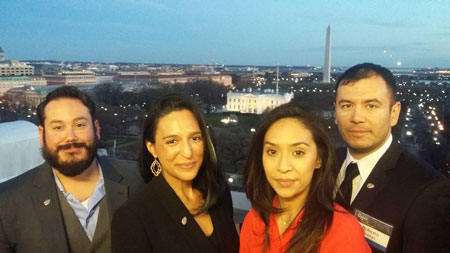By Leonard Martinez
UTEP Communications
Three years ago, the Associated Press Twitter account was hacked and a fake tweet claimed there had been two explosions at the White House and the president was injured.
Since then, other cyber attacks have taken place around the world, including attacks on power grids, dams and banks. These events reinforce the importance of preparing for cyber attacks.

Four UTEP students – two graduate students and two undergraduate students – had the opportunity to gain a deeper understanding of the policy challenges associated with cyber attacks through their participation in the Cyber 9/12 Student Challenge in Washington, D.C. in March 2016.
It challenged 40 teams from universities to respond to a realistic and evolving cyber attack, including analyzing the threat it posed to national, international and private sector interests.
“This year’s scenario was a threat to GPS capabilities in the U.S. and how it would affect those in the military and civilian levels,” said Damien Van Puyvelde, Ph.D., associate director for research at the National Security Studies Institute at UTEP. “They had to provide policy alternatives and brief policymakers, their staff, and CEOs of private companies.”
A top Department of Defense official also was included in the competition.
The UTEP team, named Students in Intelligence and National Security, learned a great deal from the experience.
“For the competition, time management was crucial,” said graduate student Hector J. Escobar. “Being involved in something like this on top of classes, work and other academic endeavors stresses the importance of balancing everything on your to-do list … Also, being able to hear how people within the cyber-security realm would respond to an event like the one presented for the competition was very insightful. Hearing the pros and cons of a variety of policy response alternatives allowed us to see the many facets of how people see the threat of a cyber attack.”
Van Puyvelde said it was good for the students to see another part of the country and visit the nation’s capital.
“It gives them an opportunity to mingle with some of the best students in the nation,” Van Puyvelde said. “It’s the best competing against the best, and they can see they need to step up their game.
“They got feedback from the professionals and they learned from people who are where they will be in five years or so. This is as close as it gets to a real-life experience and helps make them more employable.”